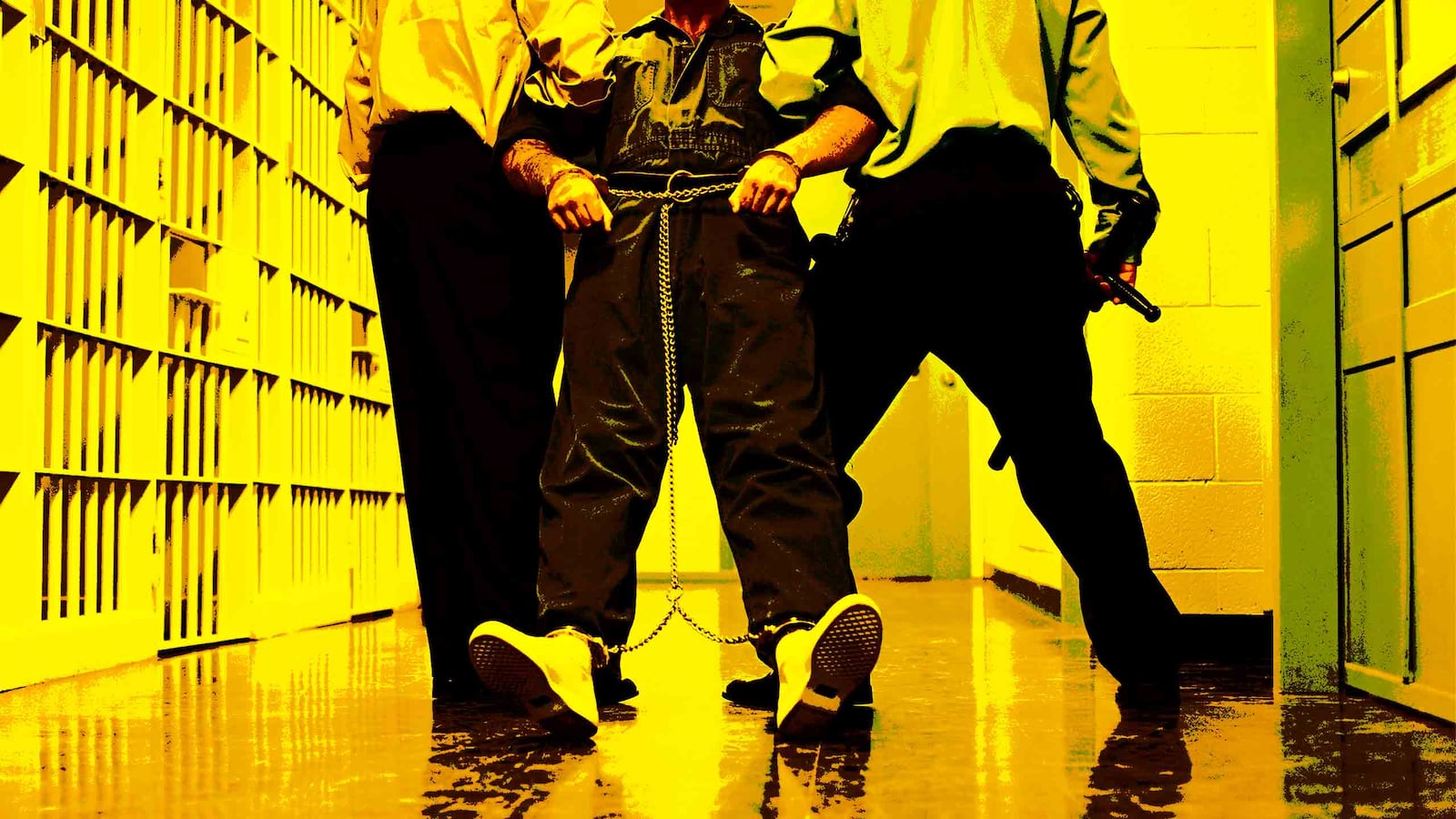DALLAS—The last time Safaa Al Shakarchi was in his native Iraq, his wife said someone put a bullet in an envelope and left it on his car—a not-at-all subtle message that it was time for him to leave. Now, after more than a year in an immigration detention facility in Texas, he’ll likely be deported to Iraq, because the U.S. government doesn’t think he has a strong enough reason to be granted asylum.
“Someone will kill him” if he’s sent back, Safaa’s wife, Zinah Al Shakarchi, told The Daily Beast.
Safaa is currently detained at Laredo Processing Center run by private prison giant CoreCivic. Zinah said her husband has twice gone on hunger strike to protest his treatment at the facility. As punishment, Zinah said guards put Safaa in solitary confinement, then turned down the temperature in his cell in an attempt to get Safaa to eat again. When that didn’t work, she said, officials threatened to cut off Safaa’s phone calls to her. Finally, officials threatened to force-feed Safaa, she said. That did it.
“He is broken,” Zinah said last week from Canada, where she is seeking refugee status.
Safaa has been held at the Laredo Processing Center since January 2017 after he, Zinah, and the couple’s two children crossed the Mexican border, turned themselves in, and told authorities they wanted asylum.
For three months, Immigrations and Customs Enforcement failed to respond to The Daily Beast’s questions regarding Safaa’s hunger strikes and detainment. On Wednesday, the agency issued the following statement:
“On Aug. 25, 2017, Safaa Al Shakarchi, a citizen of Iraq, received a final order of removal from a federal immigration judge. Al Shakarchi is currently in ICE custody.”
ICE refused to say whether Safaa has engaged in hunger strikes in the past, instead only saying “he’s not currently striking.” ICE also would not answer specific questions regarding the allegations that Safaa was punished for his strike and threatened with force-feeding.
CoreCivic did not respond to similarly detailed questions, instead saying it deferred to the company’s “government partner”: ICE.
CoreCivic did provide a link to a December 2017 Homeland Security inspector general’s report that said detainees at Laredo were “generally positive about staff treating them with respect.” The same report noted that detainees at other CoreCivic facilities complained of harsh treatment, like Muslim prayer time interrupted by guards at the Stewart Detention Center in Georgia.
Stewart is also where hunger striking inmates were allegedly shot with rubber bullets, a charge CoreCivic has denied. Solitary confinement is used at Stewart as punishment against hunger strikers, according to a study conducted by the immigrant-advocacy group Project South and Penn State Law’s Center for Immigrant Rights’ Clinic.
Detainees at facilities across the country held hunger strikes to protest their detention this year. Detainees at facilities operated by GEO Group, the second-largest private prison company, staged strikes in Washington state and California, as well as at CoreCivic’s Stewart Detention Center. Detainees at an ICE-run facility in Oregon also staged a strike and, at a CoreCivic facility in Ohio, Iraqi detainees from the Detroit area went on a hunger strike in September.
While CoreCivic deferred to ICE about Al Shakarchi, ICE employees aren’t responsible for handling detainees. At Laredo and dozens of other facilities across the country, it is CoreCivic employees who handle day-to-day operations and detainee care—and who have been accused of cruel, inept, and inhumane treatment by detainees, their attorneys, immigrant advocacy groups, and private prison watchdogs.
Reeling after an Obama administration decision to phase out the use of private companies to run federal prisons, CoreCivic and GEO Group have rebounded under President Trump. Their stock values skyrocketed after Election Day and remain high after Attorney General Jeff Sessions rescinded the Obama-era order, paving the way for private companies to secure lucrative government contracts to run federal penal institutions. Helping matters, two of Sessions’ former aides now work as lobbyists for GEO Group.
But inside facilities run by CoreCivic, things have been not so bright.
At a CoreCivic facility in Mississippi, 2,300 inmates shared one doctor—leading to a riot that killed a guard. A riot at a CoreCivic facility in Oklahoma resulted in the deaths of three inmates. The Southern Poverty Law Center detailed what it said were inhumane conditions at privately run facilities across the south in a report released in November.
At the Laredo Processing Center, The Daily Beast was told the only way to speak to Safaa would be if he initiated the phone call. The Daily Beast was not granted the opportunity to leave a phone number, a “new policy” initiated “some time this month,” a Laredo official said. ICE and CoreCivic did not respond to questions regarding this policy.
The difficulty in contacting a detainee and the allegations of punishment over hunger strikes and other acts of civil disobedience aren’t a surprise to Alan Dicker, an El Paso-based immigrant and refugee advocate.
“Facilities change their rules [for communication] all the time without explanation,” Dicker said.
In 2017, as border crossings dropped, and as the Trump administration and its allies within ICE and other federal immigration agencies began implementing written and unwritten rules regarding immigrants being granted parole—mostly, hardly ever, Dicker and other advocates say—hunger strikes cropped up across the country.
Safaa and Zinah’s story began in 2009 when, working at a facility in Baghdad that monitored food imports, Zinah refused to admit a load of sugar that had been tainted during shipment with spilled gasoline. The next day while leaving work, she says, militants aligned with the importer shot at her and other workers, striking Zinah in the arm. Soon after, Safaa arrived from the United Arab Emirates, where he was then living, and met Zinah. He fell in love with her for her bravery, she says, and the two were quickly married.
Back in the UAE they established a comfortable life. The couple had good jobs and, soon, two children. In 2016, they traveled back to their native Baghdad to attend a wedding. One day, they discovered an envelope on Safaa’s car. Inside was a bullet.
“The situation in Baghdad is very crazy,” Zinah said. “Every area is controlled by a different militia.”
Either because of her previous actions offending the Jaysh al-Mahdi militia when she refused the allow the sugar shipment to enter the country, or because of Safaa’s previous disagreements with another group that controlled his neighborhood, the couple knew it was time to go.
“We just knew we were in danger,” Zinah said.
In the UAE, Safaa was summoned by immigration officials and given 24 hours to leave the country. The couple claims they were targeted for being Shiites and began scrambling to find a way to the U.S., where they believed they had a chance of being granted asylum. With no time to even sell their belongings, they secured plane tickets to Mexico City.
Once there, the couple likely applied for the wrong kind of visa, according to Mexican immigration documents reviewed by The Daily Beast and confirmed by an immigrant advocate in Mexico City who worked directly with the couple. As a result, Safaa, Zinah, and their two children were then placed at a home for asylum-seekers, entering a Mexican refugee program that has been overwhelmed since Trump took office and the country has been forced to handle more asylum-seekers fleeing violence in Central America.
They were denied asylum and, unable to work or apply for jobs due to their soon-to-expire visas, the family faced homelessness on the streets of Mexico City. So they made a desperate move, walking into the United States on Jan. 14, 2017, at the Hidalgo Border Crossing and turning themselves into the authorities, asking for asylum.
Zinah and her children were placed in a separate facility from Safaa that day. Less than two weeks later, Zinah said, she passed a credible fear interview—the first threshold for being granted asylum—and was released on parole while Safaa remained behind bars. She made her way to Dallas, where Safaa’s brother lives, and rented a small house there. In July, an immigration judge told Safaa that he would be deported to Iraq. Zinah was in the courtroom that day, the last time she saw her husband.
“I held him,” she said. “But then they separated us and said ‘not allowed.’”
Running out of money and worrying about her own possible deportation, Zinah fled again, this time to Canada. She and her two children are currently in Montreal, where the Canadian government has given them shelter and temporary health care, according to a Canadian immigration document reviewed by The Daily Beast. They are waiting to hear whether Canada will offer them refugee status.
“This is the last hope we have,” Zinah said. “The only hope to live like human beings.”






